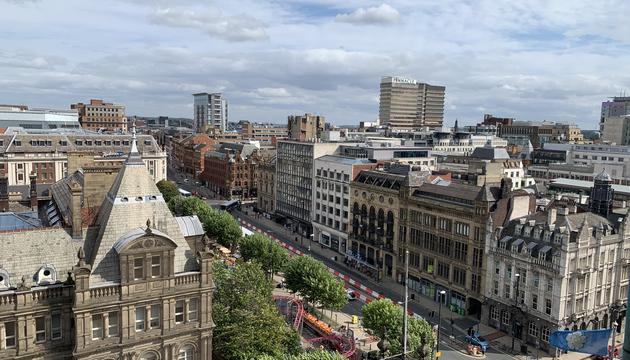
Climate Action Readiness Assessment to inform new directions for Leeds Commission
11th November 2020 - 18:33
A Climate Action Readiness Assessment devised by PCAN researchers for Leeds Climate Commission has identified opportunities for unlocking climate action at the local level.
The methodology, which uses participatory stakeholder workshops to determine states of readiness, was presented at a webinar for the ESRC Festival of Social Science 2020 on Tuesday 10 November on behalf of PCAN (the Place-Based Climate Action Network).
Professor Andy Gouldson, Chair of Leeds Climate Commission, described the CARA process, which examines five readiness categories (technical, policy, financial, community and delivery) and three different levels of ambition (low, medium and high). After levels of readiness have been agreed in the first workshop, a second workshop invites the stakeholders to home in to the problem areas and also highlight opportunities where the city is ready or nearly ready to act.
The process was applied to housing, commercial buildings, the public sector and transport, which together make up 84% of Leeds' Scope 1 and 2 carbon footprint. Leeds has 2030 net-zero target so the need to act swiftly to reduce emissions is paramount.
The presentation of the results shows that, while there is readiness in some categories, notably technical, blockages are often in the policy area (national, regional and local) and in the financial area. (This news story has more.)
The CARA work will inform new directions for the work of Leeds Climate Commission, including starting new panels on housing, transport, finance and investment, commercial buildings and the public sector. The Commission will also be extending the CARA process to consider resilience, and will be developing a net zero investment prospectus. Ongoing engagement and communications work will prioritise the messages and activities identifed through CARA.
Joined up approach needed
Speakers invited to respond to the presentation were Cllr Lisa Mulherin, Executive Board Member for Climate Change, Transport and Sustainable Development for Leeds City Council; Andy Boyle of Otley 2030; Johnny Wilson of Citu, and Jamie Sayle of SAIL (Sustainable Arts in Leeds), which is now piloting the CARA process for Leeds' cultural and creative sector.
Andy Boyle said, "The CARA process has been very helpful as these are complex issues and we need a joined up approach and the community at the table." Illustrating the scale of the challenge, he said that all of Leeds needed retrofitting and the CARA process showed that delivery for this high level of ambition is completely unready.
For Citu, Johnny Wilson said: "As a a developer in Leeds we feel supported, but we don’t have the national level support for the necessary action – the delivery readiness of the very traditional construction industry simply hasn’t got itself ready. We need to look at how we can accelerate and we need to be bold and support each other as a city."
Speaking for SAIL, Jamie Sayle said: "In SAIL we want to take tangible action on carbon reduction, not pay lip service to it, so we took the Cara framework and applied it to our sector. We found that for the low level of ambition we are fairly ready but for the high level we really need to kick things into gear."
Responding for Leeds City Council, Cllr Mulherin spoke about the need for national government to do more to remove obstacles and to enable ambitious local authorities like Leeds to push ahead. "The government's target for net zero is 20 years hence from Leeds City Council's 2030 target. Government will need places like Leeds to move faster to help us all meet our targets."
View the slides from the presentation by Andy Gouldson below.
Watch the recording of the webinar

